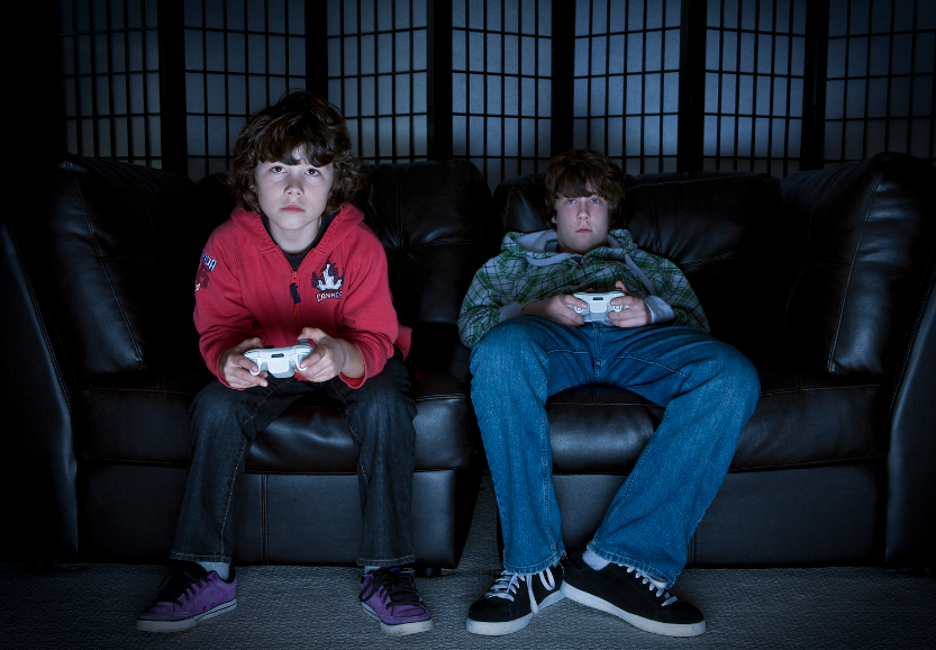Of Heroes and Villains: The Impact of Screens on Today’s Youth

The Lost Boys
Todd and Lionel, ages 13 and 9, are brothers who spend most afternoons after school alone in their apartment. The boys are not allowed to go outside after school because their mother works, and she worries about their safety and the influence of the local children. So, after warming up their Hot Pockets, they play video games or watch movies to pass the time. Their recreational screen time (ST) consumption averages four or more hours a day, and the content is often fraught with violence and sexuality.
Todd used to love Spiderman and Batman, but that has morphed into an obsession with villains, especially The Joker, Pennywise, and Jason. He is socially awkward and has few friends. His conversations usually revolve around his favorite video games and horror movies. He has little interest in physical activity and doesn’t like school.
Lionel enjoys sports but can’t play because of his mother’s work schedule and a lack of money. He is fascinated with Anime characters such as Naruto and Pokémon. Not surprisingly, he is also lagging behind his peers academically. He appears sad and has become more withdrawn even from family.
What’s the Big Deal?
Todd and Lionel are not unique in their attraction to, and time spent, playing video games, and watching digital movies. They are among millions of children in the U.S. and worldwide who are impacted by the overuse of screens. In 2021 children between the ages of 8-12 (tweens) spent an average of 5 hours and 33 minutes on their screens. Those between the ages of 13-18 (teens) spent an average of 8 hours and 39 minutes on theirs. This statistic does not include school time use. The majority of their recreational ST is spent watching online videos, playing video games, and using social media. Boys spend an hour a day more than girls on daily ST. They play more video games than girls who use social media more. Both genders spend about equal time watching videos, especially on YouTube.
Children today certainly have a different lifestyle than those who grew up pre-video/internet era. Everything from food to entertainment these days is ready-made, and gratification is instantaneous. Kids are easily bored because the high pace and repetitive nature of video games create overstimulation, which are designed to be addictive. Screen-free, imaginative, physical play is foreign to them.
Children’s social interactions are limited at best, and they are not making real connections with real people. More youth are hanging out virtually through texting, video chats, gaming, or watching movies together. This equates to not learning communication or social skills, or developing emotional resilience. They have less ability to deal with stress, boredom, and adversity, so loneliness, poor self-esteem, and anxiety result.
There is a well-documented link between excessive screen time and depression. Why? Firstly, physical activity, which is essential for good mental and physical health, has been substantially reduced by excessive ST. The CDC recommends that children 6-17 years be physically active for at least 60 minutes every day. Fewer children walk to and from school, and recess has been reduced in thousands of elementary schools, so unless a child regularly engages in team sports or dance, or can play with other neighborhood children, they become sedentary, reliant on screens to entertain them.
Depression is the leading cause of disability and poor health among children and teens. Overuse of ST rose during the COVID-19 pandemic (2019-2021) as did incidences of depression and anxiety. This statistic has not changed much since then. Depressive tendencies often carry over into adulthood and affect the quality of life and ability to thrive.
Secondly, excessive ST interferes with proper sleep, and the combination of insufficient physical activity and poor sleep hygiene is linked to depression. This often leads to poor academicperformance. This is particularly problematic during adolescence because when teens aren’t engaged in school, don’t do well, or feel overwhelmed by the workload, anxiety increases, and self-esteem diminishes. The worse they feel, the more they turn to ST, intensifying their depressive symptoms. It’s a villainous cycle.
Children can suffer cognitive and emotional impairment with early and/or excessive ST. They are not learning problem-solving skills, emotional regulation, and critical thinking, which are essential academic and life skills. These kids stand a higher chance of school burnout, leading to higher dropout rates. Low educational achievement reduces employment opportunities, leading to eventual poverty.
Technology is essential in this day and age. There are a multitude of advantages, including the convenience of communication and educational experiences that encourage attentional abilities, improve memory, and allow access to unique learning opportunities. The educational use of ST is not the primary issue here; it’s the recreational overuse of it that is harmful.
It Takes a H.E.R.O.
H: 2 Hours
Todd and Lionel, and the millions of other children in this world need their parents and caregivers to step up to be their protectors, their heroes. The first thing that needs to be done is to monitor how much time children are spending on their screens. The recommendation for recreational ST is between one and two hours daily.
E: Educate
Being educated about how to use ST to the best advantage of children will prevent a myriad of potential ills. RAISE is a free app that helps families reclaim their role as protectors of their children. Be informed about the content of what children are watching, playing, and browsing. Know how to use filters and other parental controls and talk to children about “why” they are necessary.
R: Relationships
The best replacement for screens is parental relationships. Spending more quality screen-free time with children, talking, and playing with them, will improve the relationships within families and communities. Be patient; this is a process that will take some time for them to get used to.
O: Observe
Hypocrisy is a powerful villain. Observe your own behavior. Set the example you want children to follow. Pay attention to changes in children’s moods, their interests, and who they are spending time with, and act when needed. Be the hero they need.

Shellie Ehlert is a senior at Brigham Young University-Idaho in the Department of Home & Family Studies. She is passionate about strengthening families through education. She believes in Maya Angelou’s adage that we do our best until we know better, and when we know better, we do better. Shellie’s greatest accomplishment has been her education, and her greatest joy is her husband, Jack, and their large, blended family of 9 children and 13 grandchildren. She enjoys running, studying foreign languages, and indulging in her monthly McDouble from McDonald’s.










